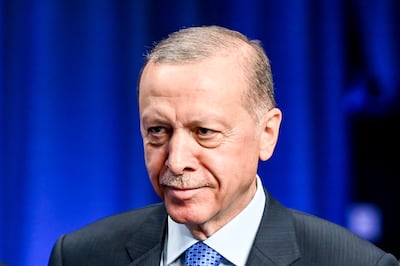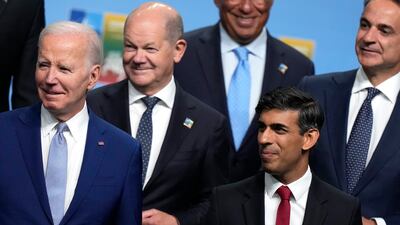When a club decides to admit a new member, that is usually business for the club alone. When that club is the world’s most powerful military alliance, stretching from the shores of Alaska to the western borders of Russia, it becomes a matter for anyone concerned about international stability and the rules-based order.
Major changes are taking place within Nato as its leaders meet in Vilnius, the Lithuanian capital. From an organisation born as a postwar opposition bloc to the Soviet Union, the alliance is not only growing in Europe – thanks to the imminent admission of Sweden – it is also expanding its reach in the Indo-Pacific region or, as the organisation puts it, “strengthening dialogue and co-operation with its partners … Australia, Japan, the Republic of Korea and New Zealand”. This is to say nothing of the considerable involvement of some Nato members in the Ukraine conflict.
There was a time, not that long ago, when a Nato summit would pass relatively unremarked, reported on mainly by defence and security specialists. Now, given the alliance’s changing composition and trajectory, as well as continental Europe’s latest war, many non-Nato countries will be keeping a watching brief on the bloc’s developing, higher-profile and consequential role in geopolitical affairs.

For example, Nato says it wants to get more involved in the fight against terrorism – often regarded as a task more aptly suited to international policing and intelligence gathering. Nevertheless, Nato has said this week it is set to appoint its first special co-ordinator for counter-terrorism.
Indeed, terrorism was just one of issues that dogged Sweden’s bid to join the alliance, with Turkey withholding ratification while demanding assurances from Stockholm regarding supporters of Kurdish separatists operating in its territory. A statement after three-way talks this week said that Turkey and Sweden would also work closely on bilateral trade and Ankara’s wider European agenda, including on EU accession and visa liberalisation. Enmeshing political and economic issues in a country’s journey to joining a military alliance is one example of how Nato – whether intentionally or not – is developing a weightier role, not only in military affairs but in how countries relate to each other bilaterally.
Sweden's journey from de facto to fully fledged Nato member will have been watched closely by other nations – particularly Ukraine, which is already asking that it be regarded effectively as a Nato country. This call will be made again at a high-level meeting between Ukraine’s leadership and Nato figures today but, given US President Joe Biden’s recent statement that Kyiv is not ready for membership, it seems unlikely that the alliance will gain a 33rd member soon.
Nevertheless, Nato is currently enjoying an invigorated position amid a challenging international security environment. With its main member, the US, being led by an unapologetically pro-Nato Mr Biden, the alliance has the time and stability to develop further. But its next steps will have to be cautious ones. The reality is that Russia, which wanted less Nato but is now faced with more, remains deeply distrustful of the organisation. The dangers posed by two antagonistic military forces facing off in Eastern Europe are already clear.
Multinational organisations inevitably develop and evolve. Indeed, this is vital to remaining relevant in a rapidly changing world. When it comes to an organisation that commands an unparalleled level of force, that growth must take place with the knowledge that a misstep will not just affect the club’s members, but everyone else as well. With great power comes great responsibility.


